Today we live in a society, which can not imagine life without expressing views on social media. Probably it does have certain advantages. Nevertheless, many participants of active discussions have already forgotten or do not even know about the developments, which unfolded in Armenia 5, 10 or 15 years ago.
To fill the gap Mediamax presents 5/10/15 project, which introduce developments in Armenia 5, 10 and 15 years ago.
• 15 YEARS AGO: APRIL 19-25, 2006
The Trans-Caspian gas pipeline and the nuclear power plant
On April 19, Armenian Foreign Minister Vardan Oskanyan said that “Armenia has set the task to join the Trans-Caspian gas pipeline and has already initiated serious negotiations with the United States on this issue.”
“In case of realization of this project, Armenia will have three sources of gas supplies: Russian, Iranian and Central Asian,” he noted.
Oskanyan observed that “the United States approaches construction of a new Nuclear Power Plant in Armenia with better understanding now.”
“As far as I understand, the nuclear power plant can also solve regional tasks for the USA. That is why the construction of the new plant seems to be real, and that’s why they are seriously considering it,” the Armenian FM added.
On April 21, Spokesman for Azerbaijani Foreign Ministry Tair Tagizade said that Armenia could not join the Trans-Caspian gas pipeline project without Baku’s consent.
“There are several reasons why Armenia cannot negotiate with the USA on this issue. The first reason is that the regional projects are impossible without Azerbaijan – as an exporter or as a transit state. Azerbaijan can cooperate with Armenia only after the resolution of the conflict and elimination of its consequences,” the Azeri official stressed.
EU insists on closure of Metsamor plant
On April 20, Austrian State Secretary for Foreign Affairs Hans Winkler, who headed the European Union (EU) Troika delegation, said in Yerevan that “the European Union is very interested in closing the Metsamor Nuclear Power Plant in Armenia.”
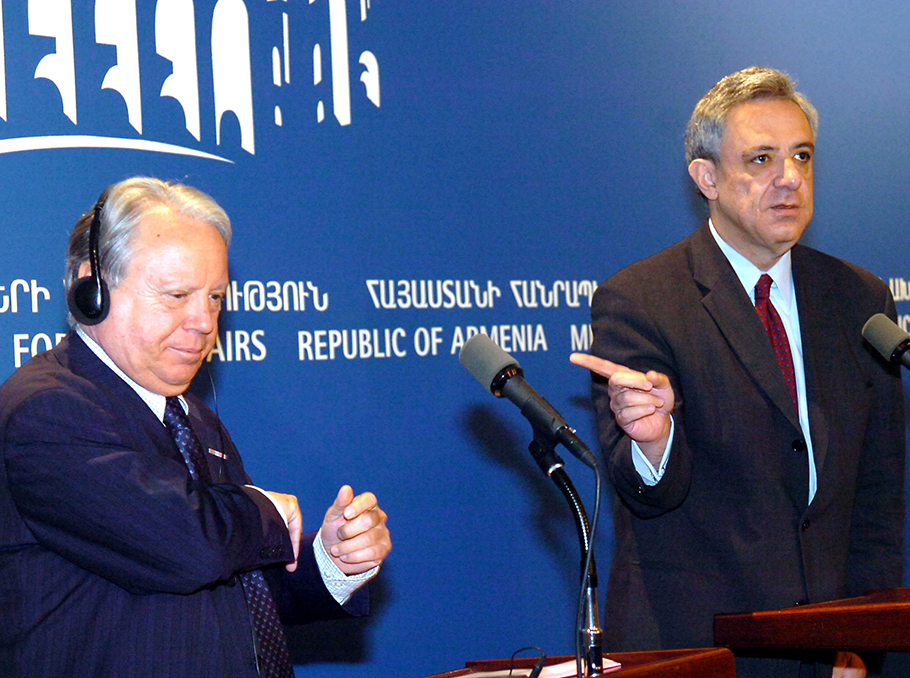 Hans Winkler and Vartan Oskanyan on April 20, 2006
Hans Winkler and Vartan Oskanyan on April 20, 2006Photo: Photolure
“The Armenian Nuclear Power Plant uses outdated technologies, which do not meet modern security requirements,” he said.
“On the other hand, EU respects the sovereign right of each country - to choose this or that type of energy that better meets its possibilities and interests,” Hans Winkler added. According to him, the EU Troika delegation did not discuss the prospects of construction of a new nuclear power plant in Armenia during the visit, “as it is outside EU competence.”
“Deepen Armenia’s inclusion in Euro-Atlantic family”
“Today, we remember one of the horrible tragedies of the 20th century - the mass killings and forced exile of as many as 1.5 million Armenians in the final days of the Ottoman Empire in 1915,” U.S. President George W. Bush said on April 24.
“We praise the individuals in Armenia and Turkey who have sought to examine the historical events of this time with honesty and sensitivity. The analysis by the International Center for Transitional Justice, while not the final word, has made a significant contribution toward deepening our understanding of these events. We encourage dialogues, including through joint commissions, that strive for a shared understanding of these tragic events and move Armenia and Turkey towards normalized relations,” the President noted.
He added that “we seek to help Armenia bolster its security and deepen its inclusion in the Euro-Atlantic family.”
• 10 YEARS AGO: APRIL 19-25, 2011
Shavarsh Kocharyan vs. Traian Basescu
Deputy Minister of Foreign Affairs of Armenia Shavarsh Kocharyan criticized the remarks of the President of Romania Traian Basescu, who had said that “Nagorno-Karabakh is a part of Azerbaijan and the conflict should be solved on the basis of the latter’s territorial integrity.”
“I would not like to think that the President of any EU member state could make such a one-sided and destructive statement. If such a statement was really made, it contradicts the approaches of the international community, the stances of OSCE and EU, the joint statements at the Ministerial Meetings in Helsinki, Athens, Alma-Ata, Astana Summit, Presidents Medvedev, Obama and Sarkozy, which clearly indicate that the status of Nagorno-Karabakh should be defined on the basis of the free expression of will, which has an obligatory legal effect,” said Kocharyan.
Serzh Sargsyan expects “more evident activity”
On April 20, Armenian President Serzh Sargsyan stated that he expected law-enforcement bodies to be “evidently more active in investigating the events of March 1, 2008”.
He made that remark at the meeting on April 20, which focused on individual issues in regard to judiciary reforms.
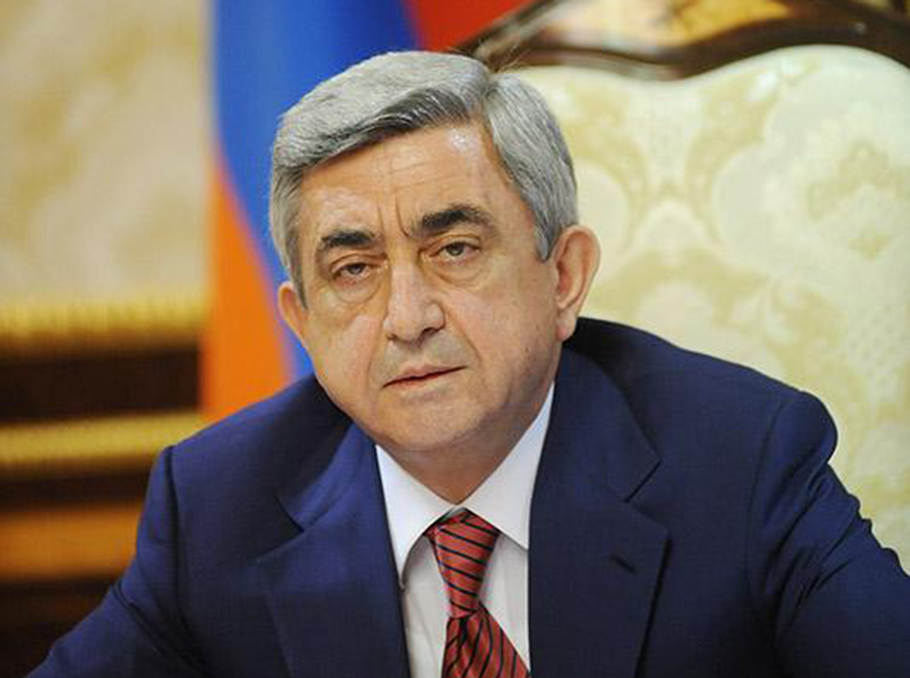 Serzh Sargsyan on April 20, 2011
Serzh Sargsyan on April 20, 2011Photo: Armenian President’s press service
“Personally for me, this is a very important issue, and my demand to you is that you must again and more scrupulously touch also upon circumstances, in which, according to you, you cannot find anything new. Try to find new ways to solve these events. Quite a lot of time has already passed, and there are people probably, who were witnesses and did not want to cooperate with law-enforcement bodies then, and today they might have other approaches. This is possible,” Sargsyan said.
“All-around corruption”
On April 21, Prime Minister Tigran Sargsyan strongly criticized the activity of notary offices of Armenia.
“All-around corruption reigns in notary offices. Notary employees do not inform citizens about state duties and charge sums, which exceed the legal rates twofold or threefold,” he said.
“Baku will react”
On April 25, Azerbaijani Foreign Minister Elmar Mamedyarov stated that Baku would react to any attempts to resume the process of normalization of Armenian-Turkish relations.
“Armenian-Turkish rapprochement is, certainly, Turkey’s decision. We cannot interfere in its internal affairs. But, on the other hand, if this process continues the same way, as before, without taking into account Azerbaijan’s interests, we will be forced to react. And the Turkish leadership has understood it. The basic factor which forced Turkey to close the border with Armenia was the occupation of Kelbajar, the first region outside Nagorno-Karabakh. And it was a conscious reaction of Turkish authorities to the occupation of Kelbajar and they can’t build relations with an aggressor country. What has changed since then? Is Kelbajar liberated? It is still under occupation. This is why we call on Turkey, as a very influential state, to play the role of stabilizer and facilitate movement within the settlement process, starting from the liberation of territories. Believe me, the withdrawal of Armenian troops from occupied territories will stimulate very positive processes,” Elmar Mamedyarov said.
• 5 YEARS AGO: APRIL 19-25, 2016
John Evans’ book
On April 21, USC Institute of Armenian Studies held the launch of the book “Truth Held Hostage, America and the Armenian Genocide - What then? What now?” written by former U.S. Ambassador to Armenia, retired diplomat John Evans.
While giving a speech to representatives of Armenian community at University of California, Berkeley on February 19, 2005, then U.S. Ambassador to Armenia John Evans called the events of 1915 “the Genocide”. A few months later, he was removed from his post of U.S. Ambassador to Armenia and retired.
“Ambassador John Evans’s Truth Held Hostage is the most important work about the Armenian genocide by a US diplomat since Henry Morgenthau’s groundbreaking Ambassador Morgenthau’s Story in 1918. Evans writes with an elegant clarity that allows us to experience his journey into a major personal and political ethical dilemma concerning the truth of history and the untruth of US government protocol in the name of foreign policy politics,” commented Armenian American writer Peter Balakian.
Lavrov: Armenia did not reject the Kazan document
On April 22, asked whether Armenia and Azerbaijan rejected the Kazan document on settlement of NK conflict, Russian Foreign Minister Sergey Lavrov stated:
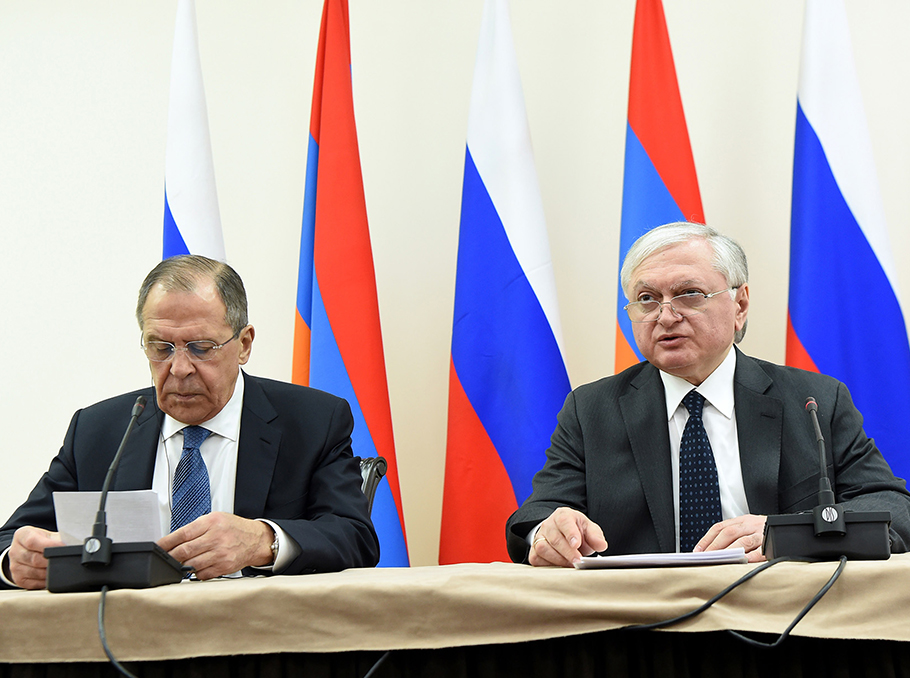 Sergey Lavrov and Edward Nalbandian on April 22, 2016
Sergey Lavrov and Edward Nalbandian on April 22, 2016 Photo: Photolure
“As a direct participant of those events, I can say that Armenia did not reject the Kazan document.”
Armenian FM Edward Nalbandian said that Azerbaijan was the party to reject the Kazan document.
“Why did it happen?”
On April 22, Russian FM Sergey Lavrov said in Yerevan that if the diplomatic process of NK conflict settlement advanced, it would have served as a deterrent to outbreaks of violence.
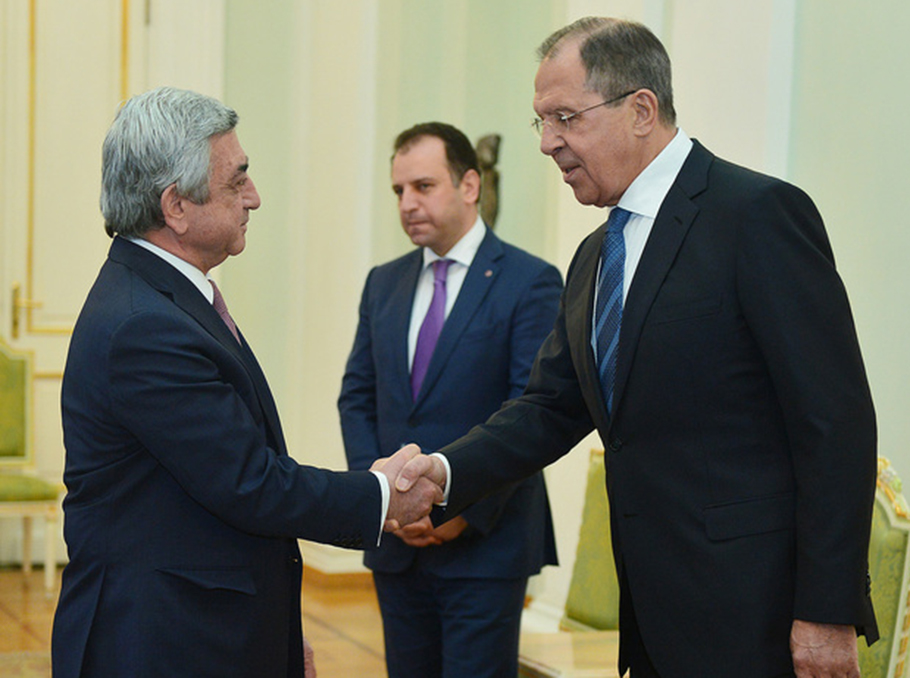 Sergey Lavrov and Serzh Sargsyan on April 22, 2016
Sergey Lavrov and Serzh Sargsyan on April 22, 2016 Photo: Armenian President’s press service
Sergey Lavrov made that remark at the meeting with Armenian President Serzh Sargsyan, when asked about Russia’s opinion on why Azerbaijan violated the Ceasefire Agreements of 1994-1995 and all verbal agreements reached by that moment.
“We were convinced that this conflict could be settled exclusively through compromises, in a peaceful way, but we have what we have today. That is why your opinion is very important for me. Why did it happen?” said Armenian President.
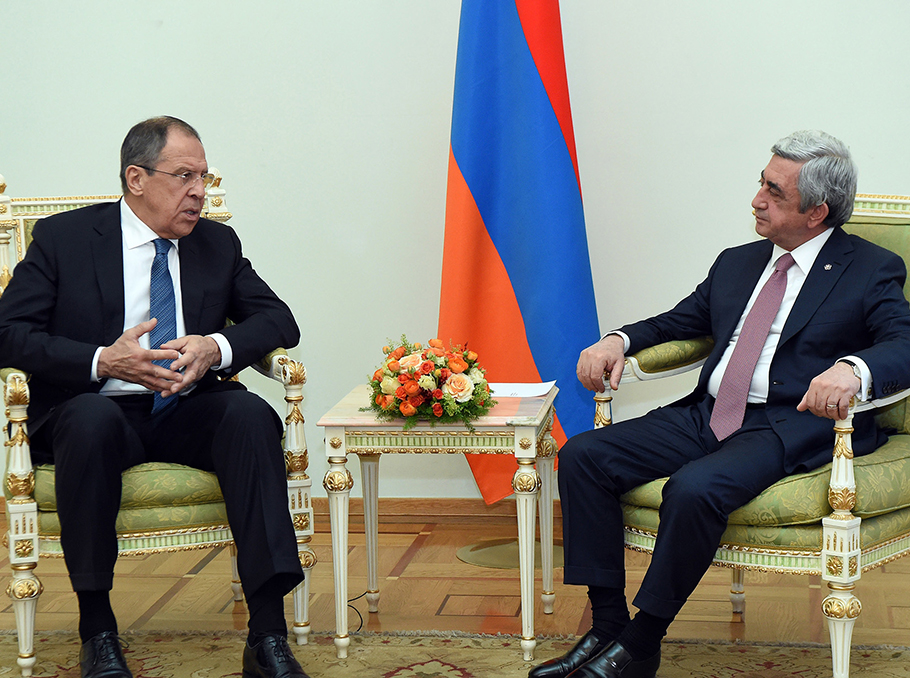 Sergey Lavrov and Serzh Sargsyan on April 22, 2016
Sergey Lavrov and Serzh Sargsyan on April 22, 2016 Photo: Photolure
“I cannot say for Armenia, Azerbaijan or Karabakh why the situation is at a critical point now, but I believe that if diplomatic process of NK conflict settlement advanced even a little, if we projected at least some principles that the sides would accept for drafting legal documents, that would surely not just play an important role in restarting negotiations, but also become a deterrent to prevent outbreaks of violence. However, I repeat that only the parties themselves can reach a solution,” said Lavrov.
The first Aurora Prize
The inaugural ceremony of Aurora Prize for Awakening Humanity took place on the day of the 101st anniversary of the Armenian Genocide - April 24, in Yerevan.
Photo: Aurora
The prize’s renowned international committee, co-chaired by actor George Clooney and Nobel Prize Laureate in World Peace Elie Wiesel, selected Marguerite Barankitse as the first Aurora Prize Laureate from the four finalists. George Clooney awarded her the Prize.
Marguerite Barankitse, from Maison Shalom and REMA Hospital in Burundi, saved thousands of lives and cared for orphans and refugees during the years of civil war in Burundi.
Ara Tadevosyan


















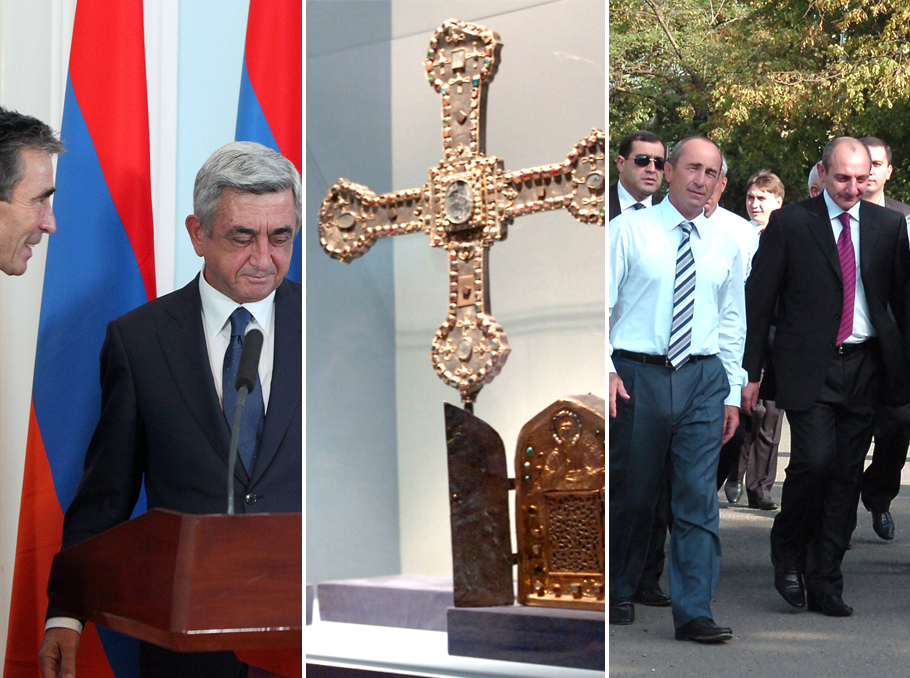
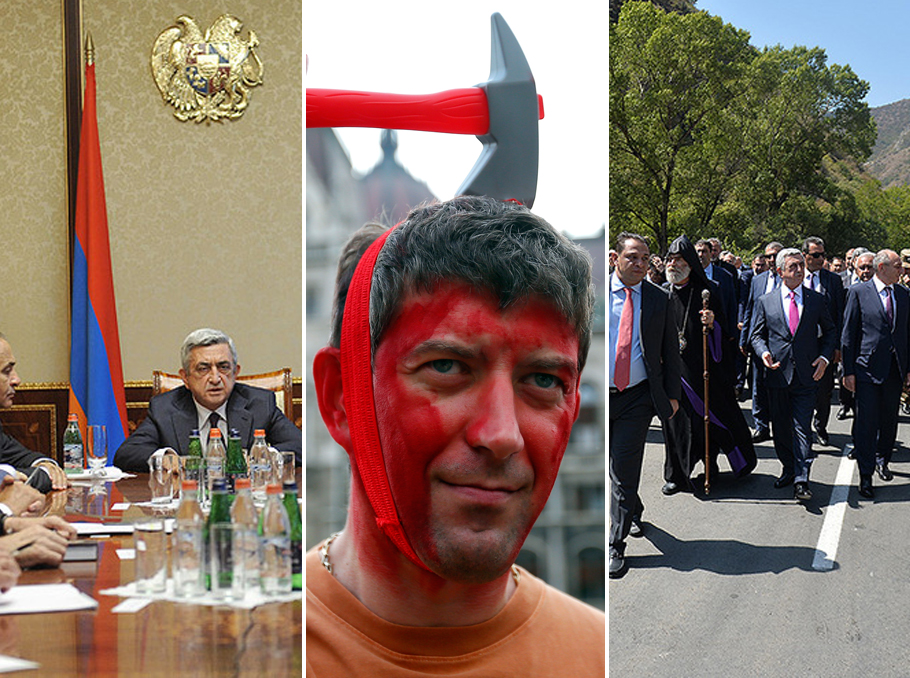
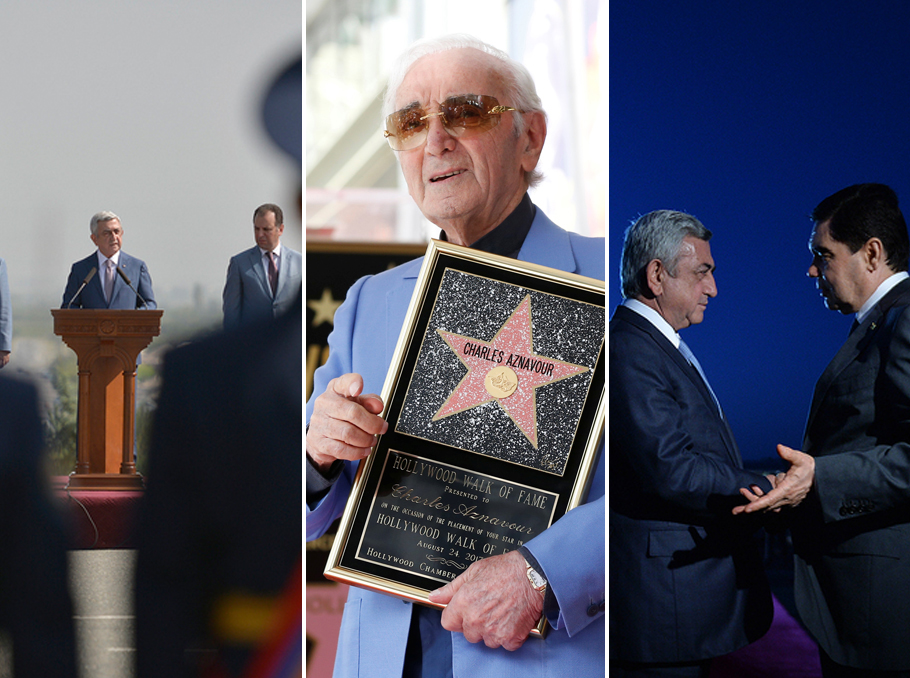
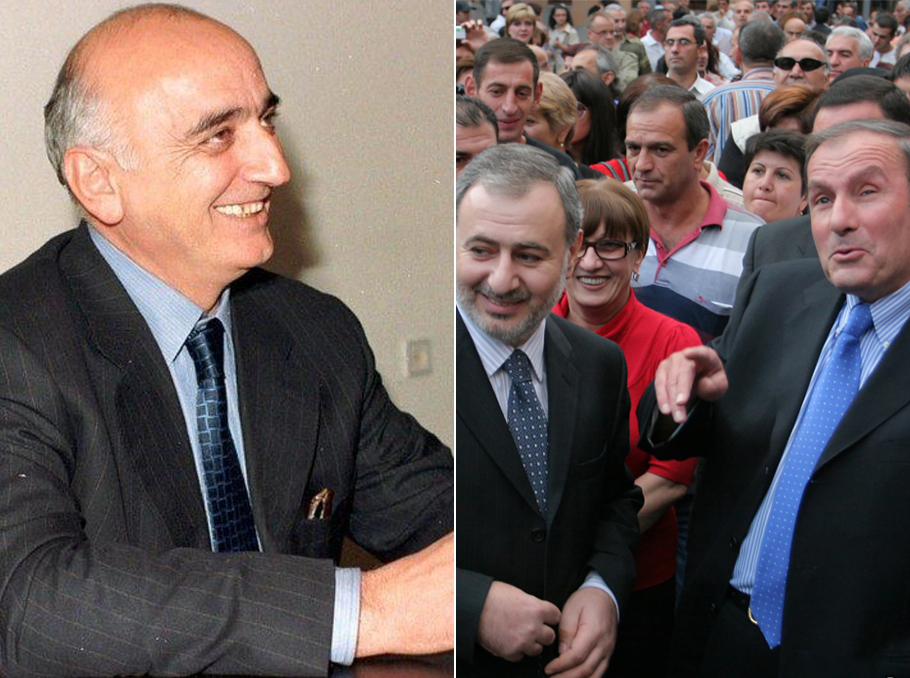
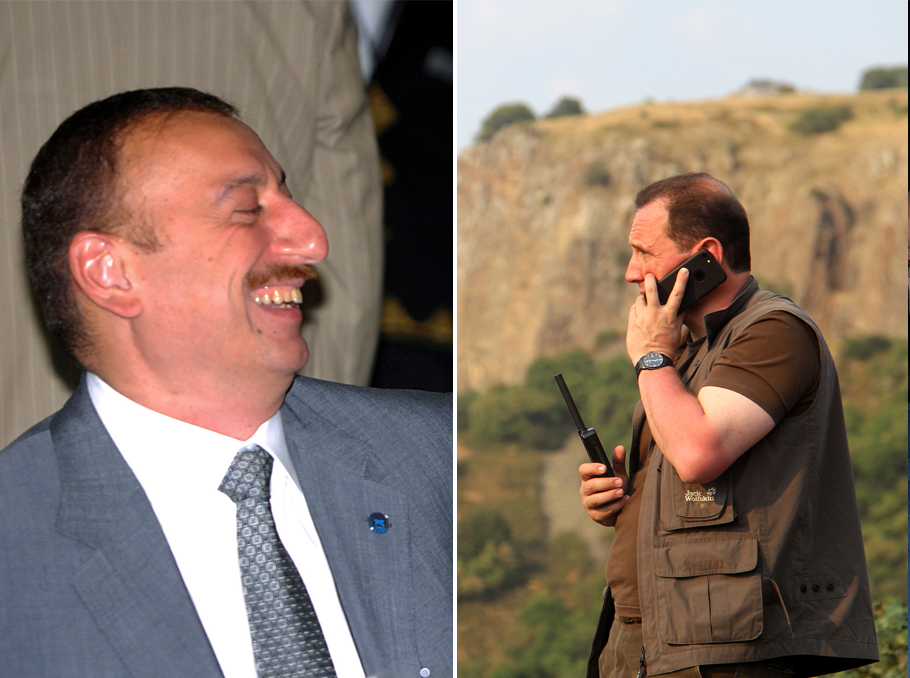






Comments
Dear visitors, You can place your opinion on the material using your Facebook account. Please, be polite and follow our simple rules: you are not allowed to make off - topic comments, place advertisements, use abusive and filthy language. The editorial staff reserves the right to moderate and delete comments in case of breach of the rules.